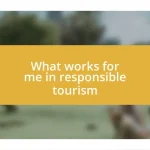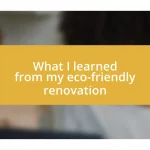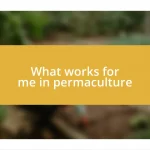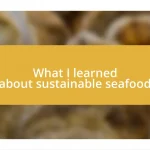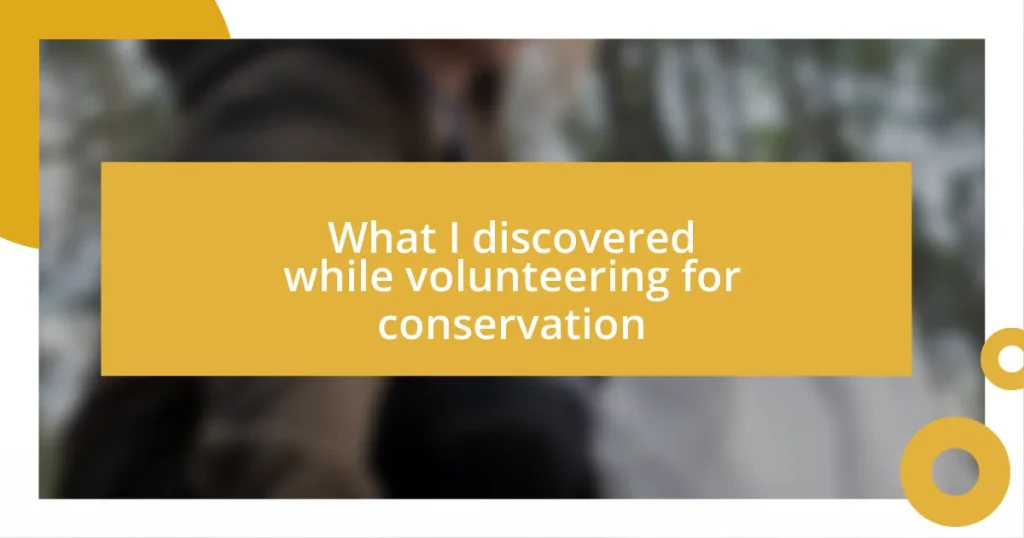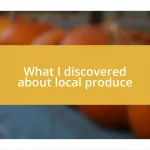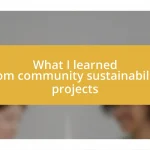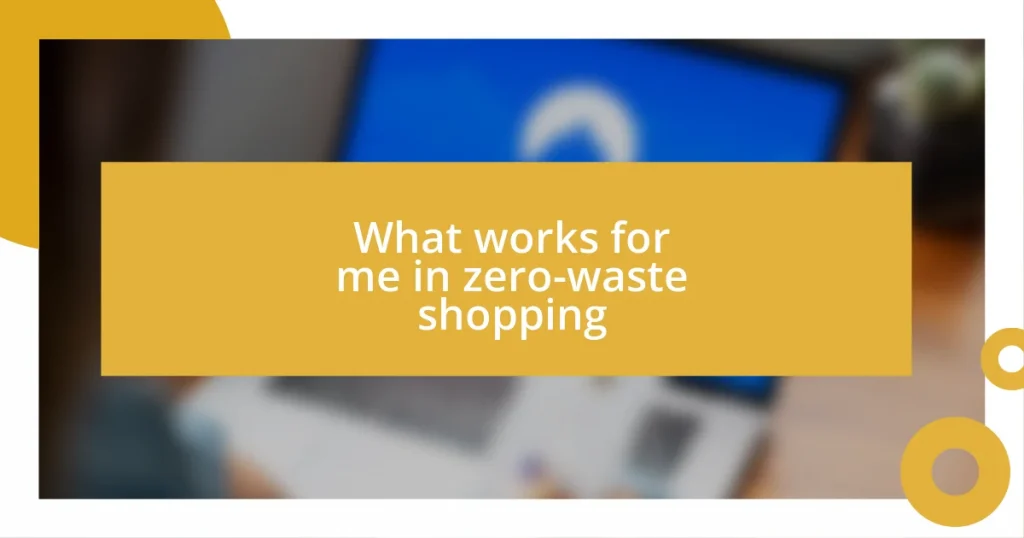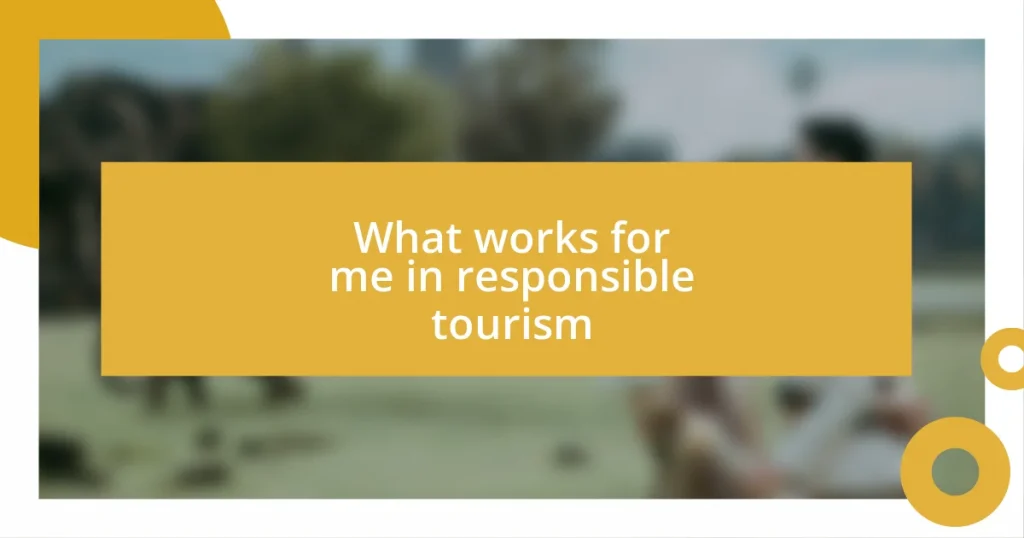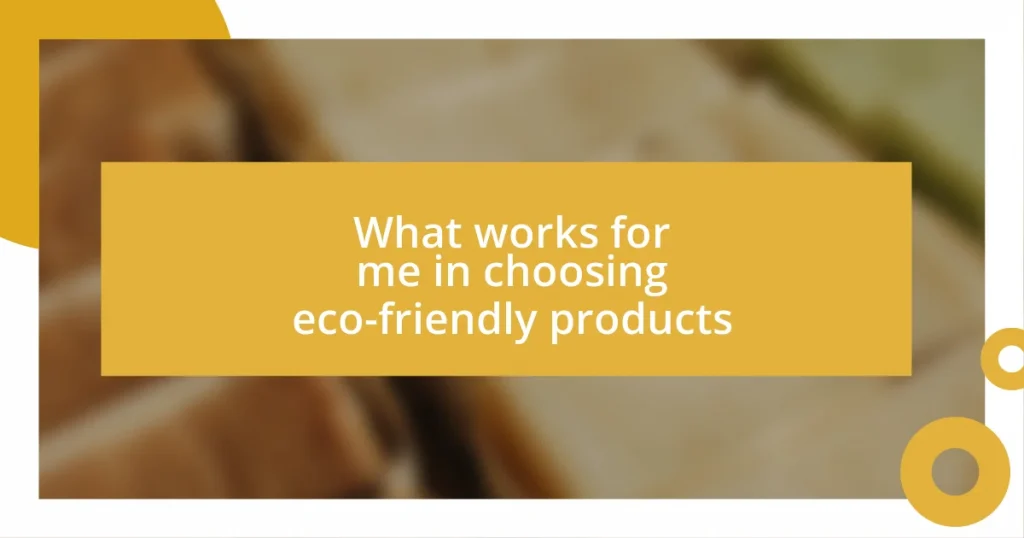Key takeaways:
- Conservation volunteering fosters personal growth, community connections, and heightened awareness of environmental issues.
- Practical skills gained include plant identification, teamwork, and problem-solving, enhancing overall resilience in challenging situations.
- Experiences of overcoming obstacles, such as weather disruptions and emotional struggles, highlight the importance of adaptability and collective action in conservation efforts.
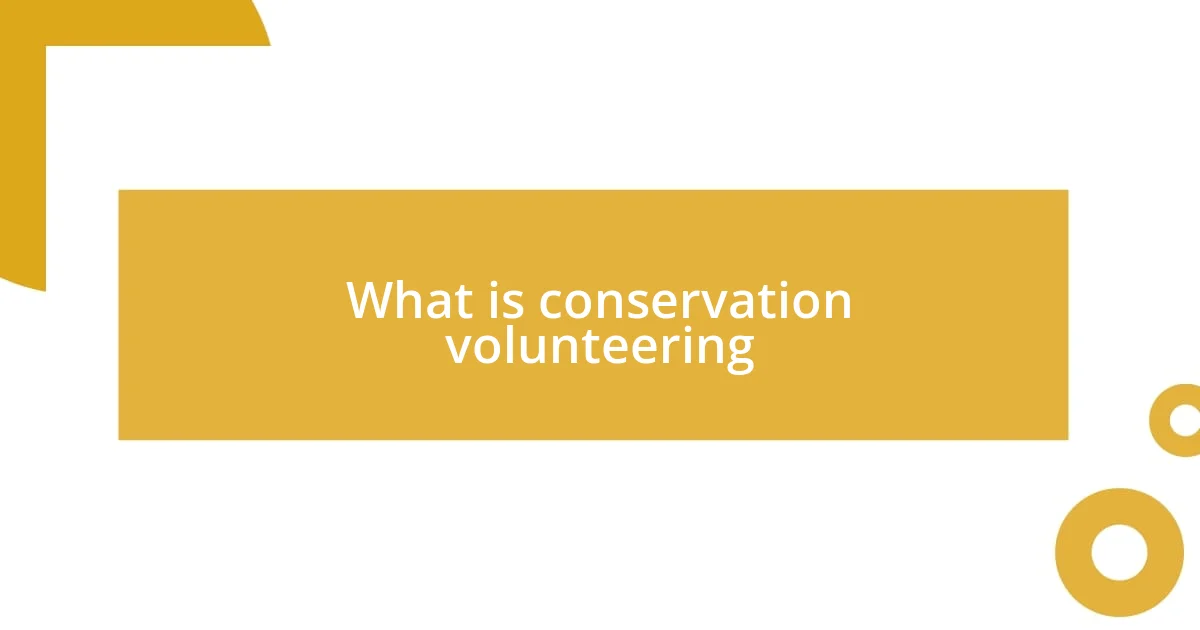
What is conservation volunteering
Conservation volunteering involves dedicating time and effort to protect and restore local ecosystems and wildlife. I remember my first day as a volunteer—standing amid a lush forest and feeling both insignificant and deeply connected to the earth. Have you ever felt that jolt of purpose coursing through you when you realized your actions could make a difference?
It’s incredible how diverse conservation volunteering can be, ranging from tree planting to wildlife surveys. I once participated in a beach cleanup, collecting debris that had washed ashore. Each piece I picked up felt like a small victory against pollution, but it also made me ponder: How did we let this happen? That sense of urgency and responsibility often transforms the mindset of volunteers, motivating action beyond just a single event.
Through these experiences, I’ve learned that conservation volunteering isn’t just about the tasks at hand—it’s a chance to connect with nature and like-minded individuals who share a passion for preservation. The friendships I formed along the way have enriched my life in unexpected ways. Have you ever thought about how much more fulfilling it is to work towards a shared goal?
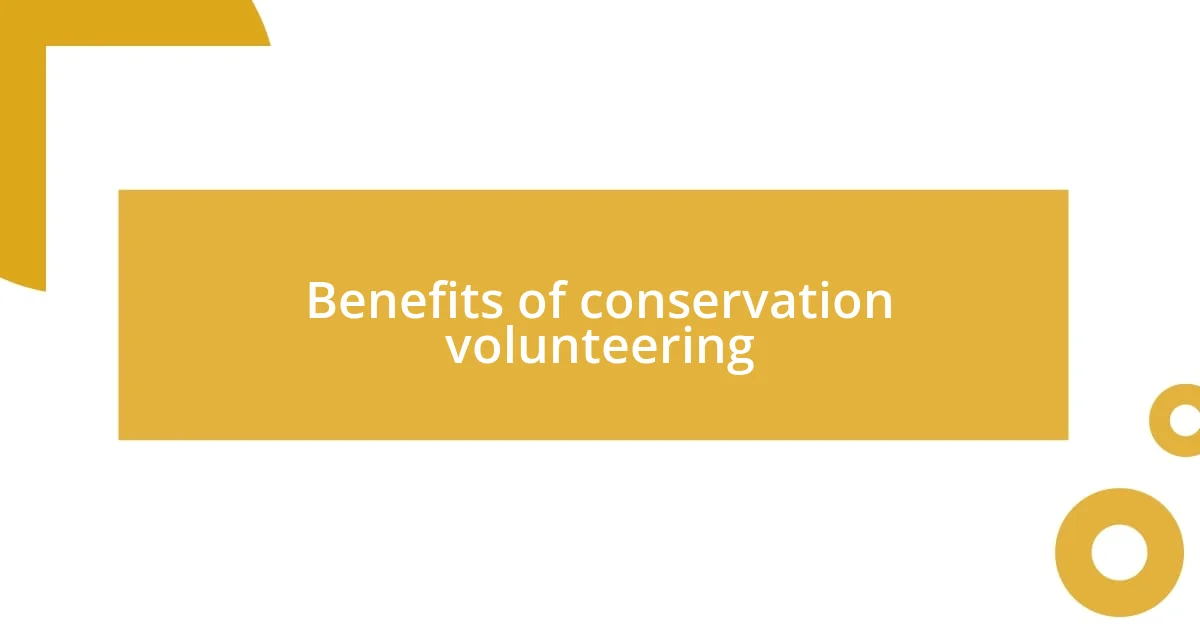
Benefits of conservation volunteering
Conservation volunteering opens up a world of personal growth. During my time planting trees, I discovered not only the joy of watching something grow but also the patience and determination it instilled in me. Each tree was a reminder that change takes time—a valuable lesson that I carry into my everyday life.
Additionally, I found that these experiences foster a strong sense of community. On one of our weekend projects, I met a fellow volunteer who shared her journey of shifting careers to focus on environmental science. Hearing her story ignited a fire within me, making me realize that volunteering isn’t just about giving back; it’s also about forging connections that inspire change in our lives.
Conservation volunteering also enhances one’s awareness of environmental issues. While tracking wildlife, I became acutely aware of how fragile these ecosystems are, and it sparked a passion for advocacy within me. I often think about how my interactions with nature during volunteering have made me more mindful of my actions. Have you ever stopped to consider how much of an impact our everyday choices have on the planet?
| Benefit | Personal Experience |
|---|---|
| Personal Growth | Learning patience through planting trees. |
| Community Building | Connecting with diverse individuals who inspire change. |
| Awareness and Advocacy | Becoming mindful of personal choices impacting the environment. |
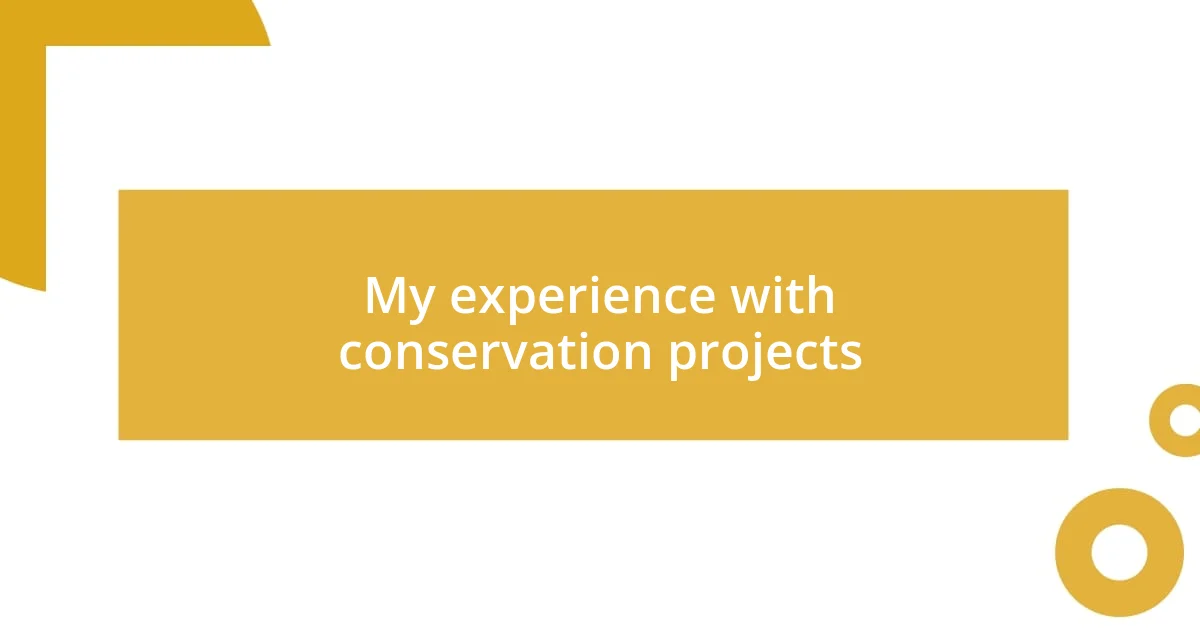
My experience with conservation projects
During my time volunteering for various conservation projects, I had experiences that profoundly shaped my understanding of the environment. One project involved working with a group to restore a damaged wetland. I still vividly remember the feeling of mud seeping into my boots as we dug in. That day was filled with laughter and a shared sense of purpose, and seeing the first signs of revitalization was incredibly rewarding.
- Engaging in local conservation efforts reinforced my belief in the power of community.
- Witnessing the immediate impact of our work filled me with hope.
- Collaborating with diverse volunteers broadened my perspective on environmental issues.
On another occasion, I assisted in a wildlife monitoring project. It was my first time seeing animals in their natural habitat, and I couldn’t help but feel a mix of awe and responsibility. Observing these creatures up close reminded me of the delicate balance within ecosystems. The shared excitement among the team as we documented each sighting fostered a sense of unity and deeper commitment to our mission. It’s moments like these that have made my journey in conservation so enriching and inspiring.
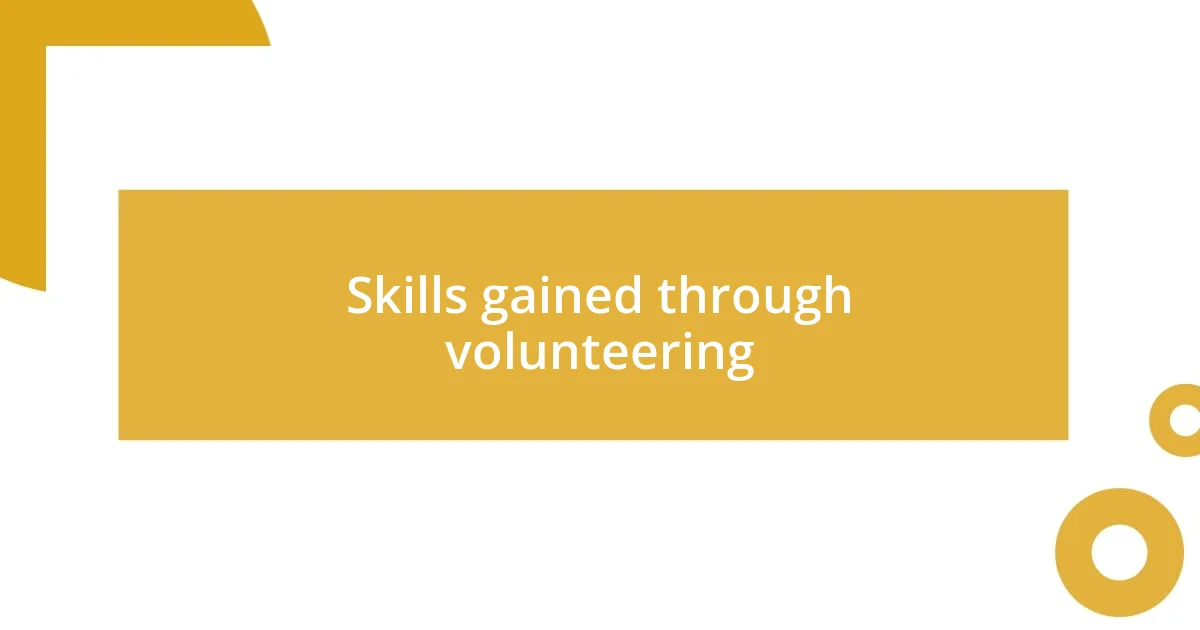
Skills gained through volunteering
Volunteering in conservation taught me practical skills that I never expected to gain. For instance, during a habitat restoration project, I learned how to identify various plant species. It wasn’t just about knowing their names; it was about understanding their roles in the ecosystem. Have you ever tried to connect the dots between a plant and the wildlife it supports? This experience sparked a curiosity in me that has only grown since.
Another invaluable skill I developed was effective teamwork. On one particularly intense day, our group was tasked with cleaning up a beach. The energy ebbed and flowed as we faced the sheer volume of trash. But as we worked side-by-side, I witnessed the true power of collaboration. It transformed a daunting task into a cohesive effort. I often reflect on how this sense of unity, despite the challenges, is essential not only in volunteering but also in tackling issues we face in our daily lives.
Perhaps one of my most profound takeaways was enhanced problem-solving abilities. I remember when we encountered an unexpected obstacle while building a birdhouse. Instead of getting frustrated, our team brainstormed solutions together, leading us to innovate without compromising our goals. This adaptive mindset has proved invaluable, reminding me that every challenge presents an opportunity to learn. How has facing obstacles shaped your ability to find creative solutions in your life?
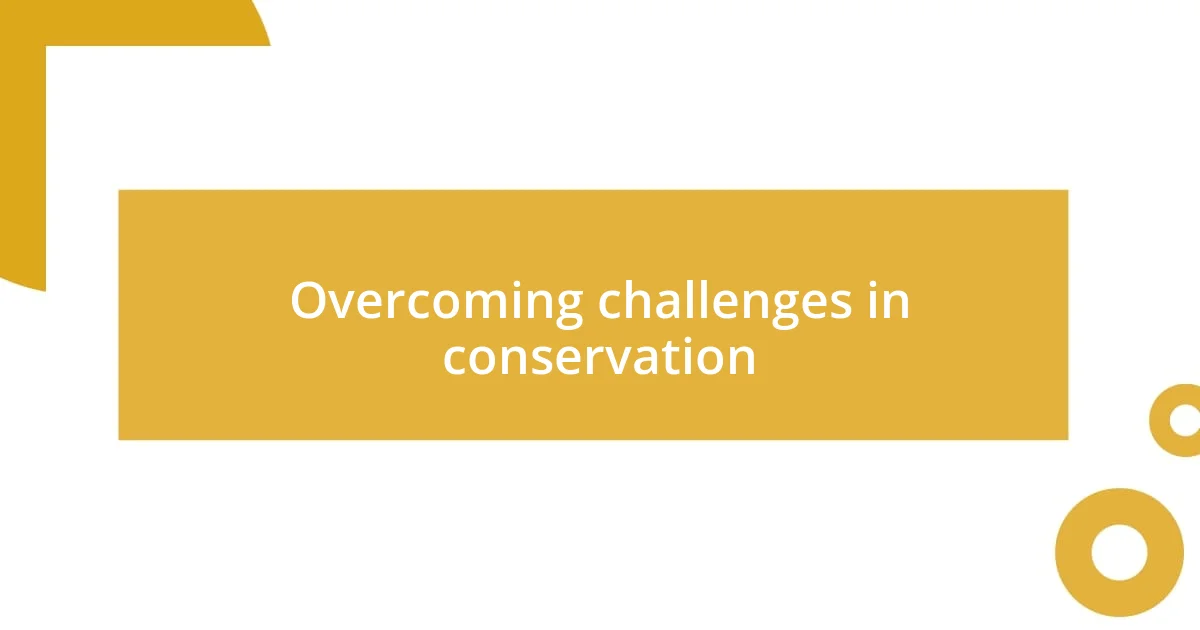
Overcoming challenges in conservation
In my conservation efforts, I often faced challenges that truly tested my resilience. One particularly rainy week during a tree-planting project created mudslides that halted our work. As frustrating as it was, the situation sparked unexpected camaraderie among us. We took turns making fun of our muddy attire, which turned our delay into laughter rather than disappointment. This experience taught me that adaptability in the face of adversity can change the atmosphere of a project entirely.
The emotional toll of conservation work can also be daunting. There were days when I felt overwhelmed by the sheer scale of environmental degradation. I remember standing on a beach littered with plastic, and for a moment, I questioned whether our small efforts could create a real impact. Yet, as we collectively picked up trash, my initial despair transformed into hope. Each piece removed felt like a tiny victory, reminding me of the importance of perseverance and collective action. How does one balance the weight of global issues with the need to keep moving forward?
Rebounding from setbacks became a vital skill during my time volunteering. I encountered an unsettling moment when a storm destroyed some of our newly planted saplings. Instead of letting it discourage us, we held a meeting to strategize our next steps. We repaired what we could and even brainstormed creative ways to fortify the remaining plants. This collaborative problem-solving process not only enriched our project but also reinforced my belief that facing challenges together makes us stronger. Have you ever found that your greatest growth comes from navigating through tough situations?

